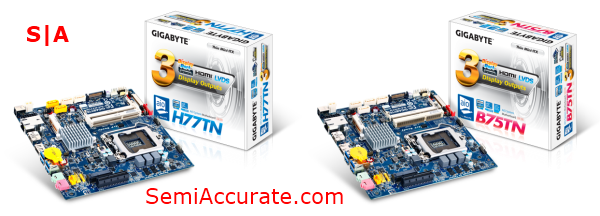 Today Taiwanese motherboard maker Gigabyte launched two new Thin Mini-ITX motherboards. These new offerings, called the H77TN and the B75TN are aimed primarily at enabling enthusiasts to construct their own All-in-one (AIO) computers and are 43 percent thinner than standard ITX motherboards.
Today Taiwanese motherboard maker Gigabyte launched two new Thin Mini-ITX motherboards. These new offerings, called the H77TN and the B75TN are aimed primarily at enabling enthusiasts to construct their own All-in-one (AIO) computers and are 43 percent thinner than standard ITX motherboards.
With the introduction of Windows 8 last year there has been significant growth in the AIO market. Gigabyte is looking to capitalize on this growing market with the introduction of their Thin Mini-ITX offerings. Traditionally, motherboard manufactures like Gigabyte, ASUS, and MSI haven’t offered solutions for AIO systems. Mostly, this is due to the tightly integrated nature of AIO systems which have traditionally made them a poor choice for a DIY project.
But the components necessary to construct an AIO computer have now been standardized to a large degree thanks to Intel’s AIO PC specifications. Of course even with standardized components the biggest barrier to building an AIO system as a DIY project is the physical constrains of the form-factor itself. To alleviate these concerns Gigabyte has addressed most of them head-on in what is more or less a how-to video.
[youtube_sc url=”http://youtu.be/eNL6DuBtFNg” autohide=”0″]
One of the other big issues with the DIY AIO market is the lack of choice when it comes to motherboard features sets and CPU manufacturer. But it likely that this issue will remedy itself as the market grows and we continue to see more entrants.
As of today AIO systems look to be the future of desktop computing, and now you can even build one yourself.S|A
Thomas Ryan
Latest posts by Thomas Ryan (see all)
- Intel’s Core i7-8700K: A Review - Oct 5, 2017
- Raijintek’s Thetis Window: A Case Review - Sep 28, 2017
- Intel’s Core i9-7980XE: A Review - Sep 25, 2017
- AMD’s Ryzen Pro and Ryzen Threadripper 1900X Come to Market - Aug 31, 2017
- Intel’s Core i9-7900X: A Review - Aug 24, 2017
